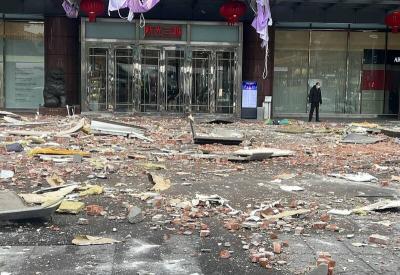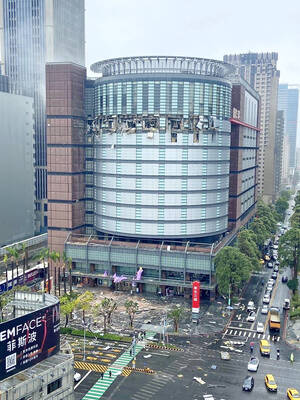US President Donald Trump has ordered his administration to consider imposing reciprocal tariffs on numerous trading partners, raising the prospect of a wider campaign against a global system he complains is tilted against the US.
The president on Thursday signed a measure directing the US trade representative and commerce secretary to propose new levies on a country-by-country basis in an effort to rebalance trade relations — a sweeping process that could take weeks or months to complete.
Howard Lutnick, Trump’s nominee to lead the commerce department, told reporters all studies should be completed by April 1 and that Trump could act immediately afterward.

Photo: Reuters
Fresh import taxes would be customized for each country, meant to offset not just their own levies on US goods, but also non-tariff barriers the nations impose in the form of unfair subsidies, regulations, value-added taxes, exchange rates, lax intellectual property protections and other factors that act to limit US trade, a copy of the memo distributed by the White House said.
“I’ve decided, for purposes of fairness, that I will charge a reciprocal tariff, meaning whatever countries charge the United States of America,” Trump said in the Oval Office. “In almost all cases, they’re charging us vastly more than we charge them, but those days are over.”
Trump told reporters that he would enact import taxes on cars, semiconductors and pharmaceuticals “over and above” the reciprocal tariffs at a later date.
Trump cited barriers in the EU, including VAT, as an example of what the US is looking to respond to. Trump has also singled out Japan and South Korea as nations that he believes are taking advantage of the US, and thus could be targeted in his latest push, a White House official who briefed reporters before the announcement said.
Reciprocal tariffs would amount to Trump’s broadest action to address US trade deficits and what he characterizes as unfair treatment of US exports around the globe. Trump has already imposed 10 percent tariffs on Chinese goods and plans to slap 25 percent duties on all US steel and aluminum imports next month.
Yet the president’s decision not to implement tariffs right away could be seen as an opening bid for negotiation — following the same strategy he has already used to extract concessions from Mexico, Canada and Colombia — rather than a sign he is committed to following through.
Traders saw the moves as a boost for risk assets, with the dollar retreating and stocks rising around the world. Speculation that negotiations would soften the tariffs, for now, eased fears of a full-blown trade war that would hurt growth and spur inflation.
“The goal is to have fair and reciprocal trade, and if we have that we will have jobs, high wages and high productivity,” Trump trade adviser Peter Navarro said on Thursday on Bloomberg Television.
The president is hoping to have a discussion with other nations about how existing policies have created an imbalanced trade environment, an official said, and he is more than happy to lower tariffs if countries want to pare their levies or remove other trade barriers.
“It’s a two-way street,” Lutnick told reporters after Trump signed the directive.
However, Trump said he did not expect to issue exemptions or waivers. He said that despite giving Apple Inc a pass on tariffs he imposed on China during his first term in order to compete with Samsung Electronics Co, this tariff package “applies to everybody across the board.”
Whatever happens, Trump’s brinkmanship has injected uncertainty into the global economy, with businesses and consumers waiting to see how Trump proceeds on a decision that could disrupt the US’ trade relationships with the rest of the world. The tariffs, if enacted, also risk driving up prices for US consumers on imported goods and exacerbating worries over inflation.
Navarro downplayed those worries on Thursday, saying the revenue raised from tariffs would be a “beautiful thing” and arguing that China-specific levies on certain key goods imposed during the first Trump administration had not meaningfully driven up prices.
“I would suggest to you that the tariffs we imposed on China were historic and large, and we had no problem at all with that,” Navarro said.
A study from the US International Trade Commission found that the costs of those tariffs were split between less-favorable margins for sellers and higher prices for downstream buyers.

UPDATED (3:40pm): A suspected gas explosion at a shopping mall in Taichung this morning has killed four people and injured 20 others, as emergency responders continue to investigate. The explosion occurred on the 12th floor of the Shin Kong Mitsukoshi in Situn District (西屯) at 11:33am. One person was declared dead at the scene, while three people were declared deceased later after receiving emergency treatment. Another 20 people sustained major or minor injuries. The Taichung Fire Bureau said it received a report of the explosion at 11:33am and sent rescuers to respond. The cause of the explosion is still under investigation, it said. The National Fire

ACCOUNTABILITY: The incident, which occured at a Shin Kong Mitsukoshi Department Store in Taichung, was allegedly caused by a gas explosion on the 12th floor Shin Kong Group (新光集團) president Richard Wu (吳昕陽) yesterday said the company would take responsibility for an apparent gas explosion that resulted in four deaths and 26 injuries at Shin Kong Mitsukoshi Zhonggang Store in Taichung yesterday. The Taichung Fire Bureau at 11:33am yesterday received a report saying that people were injured after an explosion at the department store on Section 3 of Taiwan Boulevard in Taichung’s Situn District (西屯). It sent 56 ambulances and 136 paramedics to the site, with the people injured sent to Cheng Ching Hospital’s Chung Kang Branch, Wuri Lin Shin Hospital, Taichung Veterans General Hospital or Chung

ALL-IN-ONE: A company in Tainan and another in New Taipei City offer tours to China during which Taiwanese can apply for a Chinese ID card, the source said The National Immigration Agency and national security authorities have identified at least five companies that help Taiwanese apply for Chinese identification cards while traveling in China, a source said yesterday. The issue has garnered attention in the past few months after YouTuber “Pa Chiung” (八炯) said that there are companies in Taiwan that help Taiwanese apply for Chinese documents. Minister of the Interior Liu Shyh-fang (劉世芳) last week said that three to five public relations firms in southern and northern Taiwan have allegedly assisted Taiwanese in applying for Chinese ID cards and were under investigation for potential contraventions of the Act Governing

‘LAWFUL USE’: The last time a US warship transited the Taiwan Strait was on Oct. 20 last year, and this week’s transit is the first of US President Donald Trump’s second term Two US military vessels transited the Taiwan Strait from Sunday through early yesterday, the Ministry of National Defense said in a statement, the first such mission since US President Donald Trump took office last month. The two vessels sailed south through the Strait, the ministry said, adding that it closely monitored nearby airspace and waters at the time and observed nothing unusual. The ministry did not name the two vessels, but the US Navy identified them as the Arleigh Burke-class guided-missile destroyer USS Ralph Johnson and the Pathfinder-class survey ship USNS Bowditch. The ships carried out a north-to-south transit from